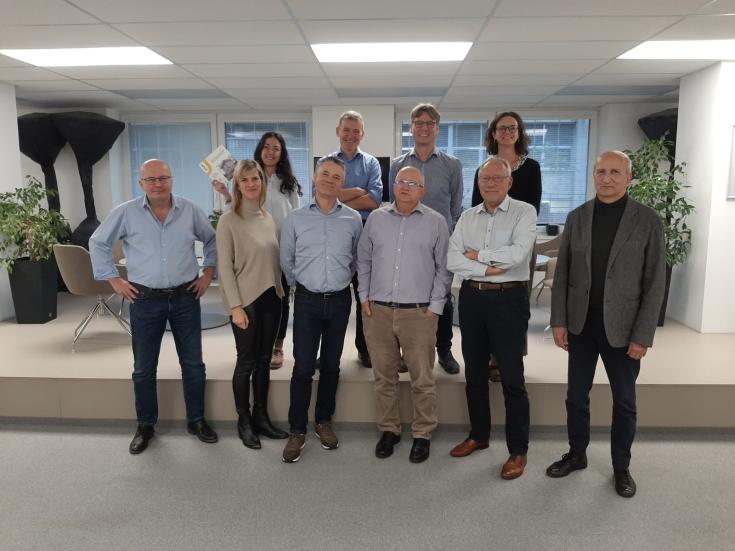New financial instruments to support development of enterprises in Usti Region

On 14-15 November 2023, the Policy Learning Platform held an on-site peer review for the Innovation Center Ústí nad Labem (ICUK), which requested advice regarding their policy challenge on the set up of financial instruments in support of local entreprises in Usti nad Labem.
The Ústí Region is going through an economic transformation linked to the decline of coal mining and the decarbonization of energy-intensive industry. The Just Transition Fund (JTF) is one of the most relevant instruments to face the impacts of the transformation of the economy.
In the Czech Republic, there is still little experience with the use of financial instruments and in particular a combination of public and private funds. ICUK was willing to better understand how to match national funds or EIB financial tools with the use of the ERDF and the Just Transition Funds at the regional level.
Peers from across Europe
Alongside Rene Tönnisson and Luc Schmerber, our Thematic Experts on ‘Smarter Europe’, four excellent peers participated in the peer review:
- Juan Carlos Martinez Barrio, CEEI-Burgos, Spain, Director of Projects Development Programme and Project Manager
- Dr Csaba Novák, IFKA, Budapest, Hungary, Head Of International Programmes
- Daniel Zimmermann, LMF asbl, Germany, Director and co-founder
- Mirosław Miller, Wroclaw University of Environmental and Life Sciences, Poland, Professor - Coordinator of R&D Programmes
ICUK aimed at looking for ways to make successful use of the Just Transition Fund by promoting the development of financial instruments that genuinely match the needs of the Czech innovation ecosystem. The recommendations of the peer review aim to further inspire and help the Region Usti and ICUK with the framework design. Besides specific recommendations related to the situation in the Region Usti, the peers and the host elaborated some practical recommendations of broader relevance for the setup of new financial schemes supporting innovation and investments in the context of industrial transition:
Recommendations
In the planning phase for a new financial instrument fostering industrial transition, a thorough and personal knowledge of the potential clients in the region and their specific needs and business considerations can be a huge advantage.
An overoptimistic planning is a major risk for new financial instruments. Focusing on numbers might lead to overestimate the potential of new funds. The use of aggregated statistical estimation of the size of the potential target for the fund does not lead to a good estimate. The programme implementation people should ideally personally know (a significant part of) the potential beneficiaries and their attitude towards transition (greener, ...).
Critical mass is thereby a key factor. Some support actions might be better treated on the national level (example: funds dedicated to the creative and cultural industries) whether others are well suited / can be better treated on the regional level (example: green tech). Local business support organisations and development agencies can help identifying the most suitable businesses and evaluate the potential use of the instruments.
Bottom-up processes are useful for involving local communities in the design of the economic transition and generating projects. This can for instance be done by using a living lab methodology.
Showcasing successful transition practices can also have a strong impact on SMEs’ behaviour. Examples from Hungary showed that visiting ‘high-tech’ working real production units can significantly increase the readiness to change of SMEs.
The funding offer also needs to be attractive compared to market conditions and include a strong protection of the SMEs (IPR, independency from the funding organisation) to generate trust in the scheme.
Running pilots through calls for proposals enables to check the feasibility of new support instruments. In a second step, successful pilots can then be scaled up in the framework of a new financial instrument.
One option is to start with a small budget for a first call for proposals and then increase the budget for the second call, if the scheme proved worth it. This can be faster, as developing new tools might take a long time.
While the piloting approach is to be recommended in general, in the case of the Just Transition mechanism, the time available might be too short to have such a piloting phase and then create a new instrument.
This approach suggests to first create a comprehensive approach to industrial transition in the region, rather than focusing on financial instruments. Key aspects are:
- Projects bringing the transition forward,
- Human capital (persons, skills) needed to implement the projects,
- Collaboration (across sectors and disciplines) generating relevant and promising projects.
All 3 aspects should be treated simultaneously.
Once relevant projects are identified, their specific needs in terms of infrastructure / collaboration and human capital / skills for the realisation of a given project need to be assesses. Identifying suitable financial instruments to address the needs comes only as the third step.
Very likely, a combination of different existing, improved or new financial tools will be needed to support interesting projects. This approach implies a flexible use of different funding schemes, according to the needs of each project.
Fostering industrial transition at scale requires to build strong relationships between businesses and the local research community. University and further knowledge organisations are to be seen as:
- Providers of human resources
- Experts – providers of knowledge and technical skills
- Drivers for innovation projects
Universities can for instance become a nest for innovation project by providing expertise and laboratories preparing the ground for future technical developments in areas of relevance to the region.
Read more about these and other recommendations in the follow-up report.
Download the full peer review report including the recommendations below.
